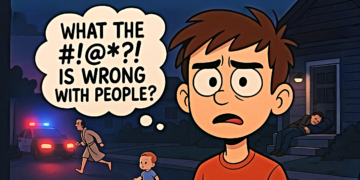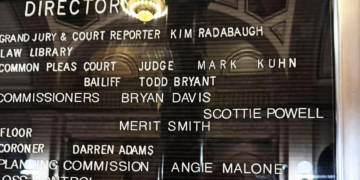All About Ohio Issue 1
There’s a proposed change to Ohio’s Constitution on the ballot this November. Depending on who’s talking about Ohio Issue 1 will either end gerrymandering or make it even worse.
Gerrymandering is when someone tweaks political districts to favor one side or the other. It’s like drawing a map to make sure your team wins. Imagine you and your friends are playing a game where the team with the most people in certain areas wins. Instead of playing fairly, you draw the game zones in a weird way to make sure your team gets the most points, even if the other team has more players overall. In politics, this happens when districts (voting areas) are redrawn in odd shapes to help one political party win more seats in elections, even if they don’t get the most votes overall. It’s like a sneaky strategy to control who wins.
Right now, Ohio districts are determined by the Ohio Redistricting Commission, which is made up of seven politicians:
- One individual appointed by the Senate President
- One individual appointed by the Speaker of the House
- One individual appointed by the Senate Minority Leader
- One individual appointed by the House Minority Leader
- The Auditor
- The Secretary of State
Not surprisingly, the party in power tends to want to draw districts that favor it. If Issue One passes, the commission would be disbanded. Instead, four retired judges, two Democrats, and Two Republicans, would appoint a committee of 15 people.
- Five Democrats
- Five Republicans
- Five people who identify themselves as Independents
Commissioners would also be required to consider communities of interest and the ability of “politically cohesive and geographically proximate racial, ethnic, and language minorities to participate in the political process and to elect candidates of choice.” The wording seems to indicate that commissioners would be required to group voters together by racial and ethnic groups and by those who speak English as a second language. Some find the language wording puzzling since you must speak English to become a citizen and only citizens are permitted to vote.
Those in favor of issues one say it will remove politics from creating districts, protect minorities, and “will end gerrymandering by empowering citizens, not politicians, to draw fair districts using an open and transparent process.”
Those opposed to Ohio Issue 1 say it’s just another form of Gerrymandering and that members of the commission will be picked randomly by retired judges with no way of knowing the character of actual political leanings of the people.
They also express concern that Ohio voters can’t remove commission members and that the commission members for any reason, even for gross misconduct. Citizens are also forbidden from suing the commission over their redistricting choices, and the commission sets its own salary without oversight from the legislature. They call this the “Forever Commission.”
According to the ballot language, Issue 1 “limits the right Ohio citizens to freely express opinions to the members of the commission regarding the redistricting process.”
The real question is whether this method would guarantee fairer districts. Or would the members of this commission bring the same prejudices to the table that political appointees have?
Voting “yes” on Ohio Issue 1 means you’re in favor of implementing the forever commission. Voting “no” would leave the state with the same committee structure in charge of the districts. The committee remains accountable to the voters so the voters can fire them.





















































































